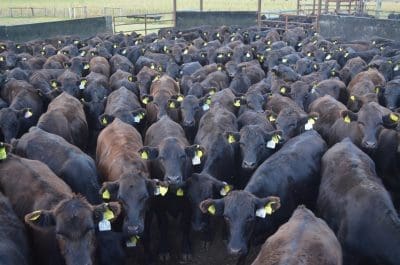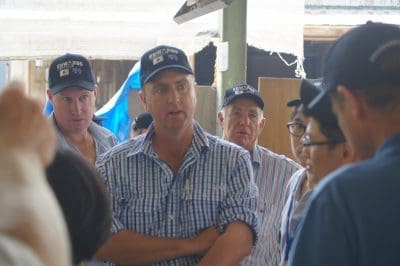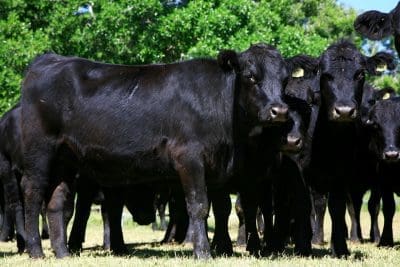 AUSTRALIA’S feeder cattle export trade to Japan has recommenced today after a suspension imposed in early June was lifted overnight.
AUSTRALIA’S feeder cattle export trade to Japan has recommenced today after a suspension imposed in early June was lifted overnight.
The Japanese Government has agreed to allow beef cattle imports to resume.
Exporter Edwards Livestock confirmed to Beef Central this morning it is now actively back in the market buying Wagyu-Angus F1 steers and heifers following confirmation of the trade resumption.
The suspension was imposed by Japan three months ago after a consignment of dairy heifers from Australia tested positive to Johne’s disease after arriving in the country.
Dairy cattle and beef cattle are exported to Japan under different protocols, however, the blanket ban was imposed on all Australian cattle, despite beef cattle not having testing positive to Johne’s.
The shock ban triggered a nightmare three months for the family-owned Edwards Livestock, their Japanese customer and other businesses that support the trade.
It was a problem not of their making and one that was outside their ability to influence or control, but it has had a massive impact on their business.
Edwards Livestock has been involved in the trade for 26 years and routinely ships 1000 Wagyu steers and heifers per month from Brisbane to Japan.
Their Japanese customer, also a family company, feeds the cattle for 500 days for supply to a supermarket customer.
1000 cattle sourced from throughout eastern Australia were on feed in Edwards Livestock’s two quarantine depots near Toowoomba about to be loaded for shipment to Japan when the ban was imposed.
It has taken three months of careful negotiations industry and Government level for Japan to agree to lift the suspension (see separate article).
“We were successful enough to split the protocols and show the differences and the risks in the two different protocols and Japan were happy to continue under that lesser mitigated risk,” Mr Edwards said.
He said the company is now “going hard” to source the cattle it needs, actively in the market for 270-320kg Wagyu-Angus F1 steers and heifers.
It will start the induction process next week with a view to sending out a double shipment to Japan in late September, to try to clear some of the accumulated stock.
‘A massive impact’
With cattle numbers in general in very short supply, the ban’s timing could not have been worse.
Edwards Livestock has had to continue accumulating steers and heifers to maintain its long term relationships with suppliers, even though it has not been able to ship the cattle on to its customer.
With 500-day feeding regimes the Wagyu industry is based on long-term supply arrangements.
This interruption stood to heavily impact Edwards Livestock’s Japanese customer during their peak period of demand in December 2017. Japanese meat importers have sought to use the disturbance to win some of their supermarket customers business.
However Mr Edwards said Edwards Livestock has continued to accumulate cattle throughout the duration of the ban to minimise the supply impact on their customer and, in turn, their supermarket customer.
Overall the impact had been massive on Edwards Livestock’s business, Mr Edwards said.
“Not only the negative in the market place caused by one exporter in the south, but the uncertainty for our suppliers and ourselves as a business,” he said.
“We have had to honour our contracts and keep the supply of cattle coming into us, and have spent the last three months feeding cattle at a huge cost to our business.
“Locally we operate two quarantine facilities, and between feed companies, transport companies and casual staff, it has been pretty tough on everyone.
“And often in these things no one thinks about the end user in Japan.
“They are a family company that started this job 30 years ago, they are tied into a supply chain with a supermarket.
“We have all had to in good faith between all of us keep accumulating those cattle, just to the keep the trade alive, because if we didn’t and it got to this point and there no cattle to go on ships, there would have been no point in any of it.”
Edwards Livestock will send a shipment of 2500 cattle in late September to “clear the decks” of accumulated cattle and restore supply for their customer’s feedlot.
“We have all those cattle on hand over the last three months, we have held them and held them, and fed them and fed them, now we will go with the double shipment.”
- See Agriculture Minister Barnaby Joyce’s comments on the re-opening of the live trade with Japan here.
- The minister has confirmed the trade has re-opened to both beef and dairy cattle





I am raian from morroco
Glad to contact with your company.
Acctually we Looking forward to importing original strain wagyu. Considering its rare specifications in the quality of meat.
I wonder can you provide us a 3 heads of original breed 100%
May I know what it mean by Wagyu Angus F1.
An F1 Wagyu Angus is the calf of a Wagyu bull and an Angus cow. These days in Australia, a ‘Wagyu bull’ is generally defined as Fullblood Japanese breeding, meaning the descendant of animals bred in Japan, with no ‘upgrading’ from other breeds involved. Editor
A long 3 months? Onward and upward from here. Good to see your trade back up and running.
All the best,good to see the trade back up and running.